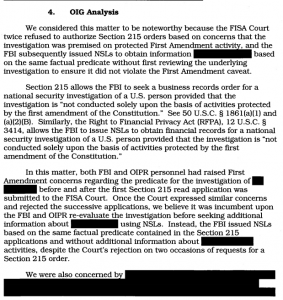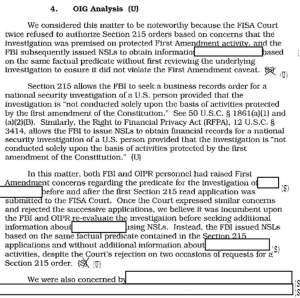What the Reporting on the Re-Released DOJ IG Report on Section 215 Missed about FBI’s Misuse of Terrorism Tools
I’ve been meaning to return to coverage of the re-release of the DOJ IG Reports on Section 215 liberated by Charlie Savage just before Christmas. I’ve been seeing a lot of focus on posts like this which “report” that FBI used NSLs to get data the FISA Court would not approve under Section 215 for First Amendment reasons. Such a focus drives me batshit for 3 reasons:
- It is not news that the FBI used an NSL to get data the FISC deemed improper under the First Amendment
- There are actual, current problems with NSL practice to be more concerned about
- In addition, the FBI has been sitting on a current Section 215 IG Report
It is not news that the FBI used an NSL to get data the FISC deemed improper under the First Amendment
As I noted (and as most outlets seem to have missed) these two reports are re-releases of old DOJ IG reports, part of a series of re-released reports in response to a Charlie Savage lawsuit. And while this release is not quite so bad as the previous release — in which FBI actually reclassified previously public words! — there’s still very little that’s new. In addition to the phone dragnet appendix we’ve all been waiting for (which I wrote about here), the most significant newly released material pertains to how FBI shares Section 215 information with foreign governments (including the declassification of descriptions of that use, as on page 27, 29). The most interesting new material may be a reference on page 20 that reveals OIPR only temporarily stopped using combination orders in 2006 after the passage of the PATRIOT Reauthorization. This suggests they may have resumed using them to get location data, as I laid out here(and as clearly admitted by James Cole here).
But that’s, for the most part, it. There are only words here or there that are newly released.
Not only was the NSL-replacing-a-215-request not new, but there were congressional hearings on it when the report initially got released.
Indeed if you compare this passage from the original 2008 release:
With the same passage from the re-release:
You can see that the revelation about the use of an NSL where the court had already rejected a Section 215 order has not changed (there are a few new words revealed elsewhere).
It seems the lesson we should take from this new release is precisely the same I took from the last one: this is ridiculous! We’ve been talking non-stop about Section 215 for 18 months, and yet all that discussion hasn’t led to anything but foreign sharing and a brief appendix to be released?
There are actual, current problems with NSL practice to be more concerned about
The focus on problems with an individual Section 215/NSL years ago distracts from ongoing problems with NSLs revealed in the DOJ IG Report released earlier this year.
Those problems include:
- FBI not only can’t accurately count how many NSLs it issues, but “attempting to obtain 100 percent accuracy in the NSL subsystem would create an undue burden without providing corresponding benefits”
- A significant chunk (and possibly a very big) chunk of what the FBI can’t count are “sensitive” requests that might be sensitive targets (like journalists or politicians) or counterintelligence NSLs; FBI doesn’t use its automated tracking system for some or all of these NSL requests and DOJ’s IG is specifically excluded from any review of such requests
- FBI still appears to use NSLs to track journalists
- The FBI refuses to do modern things like track its NSL use electronically, and for the dead tree tracking it does do on NSL request backups, it does not have that backup for 50% of its requests
- FBI obtains stuff using NSLs that DOJ’s IG doesn’t think really fits into the definition of toll data; it also fairly routinely obtains records for all friends-and-family on an account
- The FBI and the Intelligence Oversight Board have changed the terms for what counts as a violation, even while the IG thinks those things remain violations (as a result, the FBI boasts about its entirely artificial lower violation rate)
- FBI insisted on redacting things in this report — not just from us, but also from Congress — that had been unredacted in the past — including what they’re getting and what constitutes a violation
That is, it seems FBI is still doing funky things with its NSLs, but doing a better job of hiding it all, even from Congress.
Want to do some reporting on NSL outrages? Try reporting on current practice, not rehashing stuff that happened 8 years ago.
The FBI has been sitting on a current Section 215 IG Report
Then there’s the matter of the current DOJ IG Report on Section 215 — a report that has been pending (by my rough count) for 1,663 days, or over 4.5 years. DOJ IG finished it months and months ago, but FBI and other Intelligence Community members have been stalling its release in a classification review. Given that DOJ’s IG said in December 2013 that how much he could release with this report depended on how much FBI declassified from all his office’s previous reports, and given that they’re not substantially declassifying anything more, it seems they’re trying to bury a report on a program under current debate by classification.
That we’re waiting for such an old report means we’re still waiting on detailed reporting from 2009, the year of the big Section 215 violations. It means we’ve got no independent assessment of how FBI is currently using Section 215 (besides the phone dragnet).
Moreover, I all but guarantee you that report will focus on two issues — FBI’s outright refusal to follow PATRIOT Reauthorization law as passed in 2006 and adopt minimization procedures for Section 215 use, as well as an assessment of request approval times (which should impact any consideration of an emergency request provision) — that are absolutely central to discussions of USA Freedom Act. While limited members of Congress have been briefed on the report (which is probably where the minimization procedures — which are not necessarily even as stringent as what FISC already imposes — in USAF came from), it has not been made public that FBI has basically contemptuously refused to follow the law for 8 years now. It has not been made public that in the face of FBI refusing to follow Congress’ bidding, Congress instead would adopt weak tea minimization procedures in USAF that don’t do what the original law required — limit the retention and dissemination of Personally Identifyiable Information.
Meanwhile, we had a bunch of good government types running around saying we need to rush through USAF for its transparency provisions without waiting for the report that has been pending for years. What the fuck good does such “transparency” do if the Agencies can bottle it up using classification review? What the fuck good does transparency do if we rush through legislation before we actually learn what transparency would teach us?
Perhaps I’m a bad judge here, because I’ve been patiently waiting for this report for so long. But it seems the failures to finish and publicly release this report exemplify FBI’s refusal to put order to and have oversight on its terrorism tools. It reflects a systemic problem that goes beyond an improper request back in 2006.



.
It’s kind of like a D-list musical act releasing a “best of” album.
.
Maybe DOJ should just get old DOJ alums to do a late night infomercial on obscure cable networks when they re-release these things. “Remember the good old days? We’ve got your all-time favorites, all on CD. For a mere four payments of $19.95 plus shipping and handling, we can send them all to you in monthly shipments . . .”
Imagine if an IG had the authority to overrule its own agency and make its own decisions about declassification . . .
.
If you want to say “The IG has independent authority,” giving them that kind of power would seem to be required. If they can’t make a decision about what they are able to share about their investigations, there’s nothing “independent” about their work.
quote”If they can’t make a decision about what they are able to share about their investigations, there’s nothing “independent” about their work.”unquote
Investigator General. Independent. Reports. Declassified. Haha. Ringling Brothers Greatest Show on Earth entertainment model.
quote’Perhaps I’m a bad judge here, because I’ve been patiently waiting for this report for so long. But it seems the failures to finish and publicly release this report exemplify FBI’s refusal to put order to and have oversight on its terrorism tools.”
note to self..file “waiting for FBI IG reports” under…
When not to hold your breath.
quote”That is, it seems FBI is still doing funky things with its NSLs, but doing a better job of hiding it all, even from Congress.”unquote
Funky Things. Title 223 in the FBI handbook of authorized Deception and Obfuscation techniques.
sheezus..I keep telling myself the Matrix was only a movie. And then I wake up. Meanwhile, …
http://www.ca9.uscourts.gov/content/view.php?pk_id=0000000715